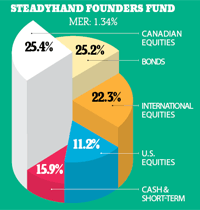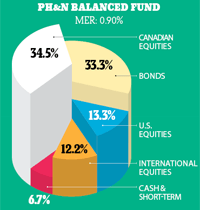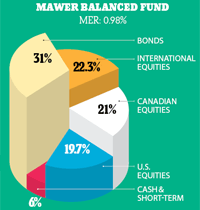When mutual funds are a good idea
We’ll show you why low-cost funds are still appropriate for many.
Advertisement
We’ll show you why low-cost funds are still appropriate for many.
 Shannon Dalziel, a fee-based investment adviser at PWL Capital in Toronto, knows all too well that mutual funds have a terrible reputation. It’s not uncommon for her clients to balk at the very notion of using them—and it’s easy to understand why. Canada’s mutual fund industry is mired in a tradition of outrageous fees, hidden sales charges, and self-interested salespeople who have eroded the public’s trust.
So it’s little wonder that exchange-traded funds—which usually have much lower fees—are often perceived as the only investment tool for savvy savers. “What many people don’t seem to realize is the structure of mutual funds is perfectly sound,” Dalziel says. “When used correctly, mutual funds can be very appropriate for certain types of investors.”
There’s no question ETFs are one of the best things to happen to Canadian investors in decades, but they’re not for everyone. For starters, you normally pay commissions to buy and sell them, which makes them unsuitable for small accounts (you typically need at least $50,000 to make them cost-effective) or those who make preauthorized monthly or biweekly contributions.
ETFs are also fairly complicated for the novice, since they’re bought and sold like stocks through a discount brokerage. Not everyone is comfortable managing their own portfolios this way, and while you can enlist professional help and buy ETFs through full-service brokers, many financial advisers are not licensed to sell ETFs. Those who are often work only with wealthy clients.
Mutual funds, on the other hand, are easy to buy through banks, fund companies, independent advisers or discount brokerages. There are usually no commissions when you set up automatic contributions, making them ideal for regular savers. Actively managed mutual funds also give investors the opportunity to earn market-beating returns and the peace of mind that comes from knowing a professional is managing your portfolio during times of market volatility.
The key, as Dalziel points out, is learning to use mutual funds correctly, and to avoid their many pitfalls. Let MoneySense show you how.
Shannon Dalziel, a fee-based investment adviser at PWL Capital in Toronto, knows all too well that mutual funds have a terrible reputation. It’s not uncommon for her clients to balk at the very notion of using them—and it’s easy to understand why. Canada’s mutual fund industry is mired in a tradition of outrageous fees, hidden sales charges, and self-interested salespeople who have eroded the public’s trust.
So it’s little wonder that exchange-traded funds—which usually have much lower fees—are often perceived as the only investment tool for savvy savers. “What many people don’t seem to realize is the structure of mutual funds is perfectly sound,” Dalziel says. “When used correctly, mutual funds can be very appropriate for certain types of investors.”
There’s no question ETFs are one of the best things to happen to Canadian investors in decades, but they’re not for everyone. For starters, you normally pay commissions to buy and sell them, which makes them unsuitable for small accounts (you typically need at least $50,000 to make them cost-effective) or those who make preauthorized monthly or biweekly contributions.
ETFs are also fairly complicated for the novice, since they’re bought and sold like stocks through a discount brokerage. Not everyone is comfortable managing their own portfolios this way, and while you can enlist professional help and buy ETFs through full-service brokers, many financial advisers are not licensed to sell ETFs. Those who are often work only with wealthy clients.
Mutual funds, on the other hand, are easy to buy through banks, fund companies, independent advisers or discount brokerages. There are usually no commissions when you set up automatic contributions, making them ideal for regular savers. Actively managed mutual funds also give investors the opportunity to earn market-beating returns and the peace of mind that comes from knowing a professional is managing your portfolio during times of market volatility.
The key, as Dalziel points out, is learning to use mutual funds correctly, and to avoid their many pitfalls. Let MoneySense show you how.



Share this article Share on Facebook Share on Twitter Share on Linkedin Share on Reddit Share on Email